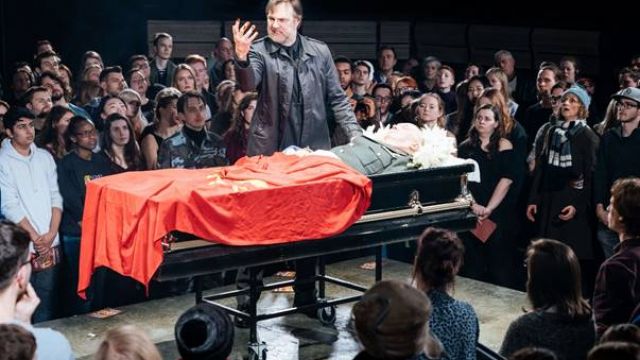Julius Caesar
This National Theatre Live presentation of the Bridge Theatre production of Julius Caesar is a model of clarity and focussed emotion. While the play is an uncanny paradigm for some sadly familiar political disasters, at its centre is the figure of Brutus – it is, in textbook terms, ‘Brutus’ story’. Ben Whishaw plays him superbly as a vacillating intellectual – undoubtedly decent and even, as Mark Antony says sarcastically, ‘honourable’, but a member of a remote elite, a man whose thinking is more theoretical than realistic, more ‘academic’ than practical. His casuistry can rationalise anything (the audience occasionally laughs at him) and he has no inkling of the forces he’ll unleash. His foil is Cassius (Michelle Fairley – yes, a woman), the character Julius Caesar (David Calder) says has a ‘lean and hungry look’.
Ms Fairley is riveting – sharp, definite even in error, banked fires of emotion just kept in check. It is fascinating to see Ms Fairley’s Cassius and Adjoa Andoh’s Casca – the latter with a brusque and very definite manner - in contrast to Brutus’ wife Portia (Leaphia Darko) and Caesar’s wife Calpurnia (Wendy Kweh), both the more traditional Roman wives – i.e. of inferior status. In this production, so-called ‘colour blind casting’ and gender swapping in key roles are no distraction at all thanks to the emphasis on the charged dynamic among the characters. The pace is fast, the emotions intense, the adrenalin level high and the effect is riveting.
The new and very adaptable Bridge Theatre is the brainchild of director Nicholas Hytner and Nick Starr, designed for up to 900 seats, but also allowing for various configurations – end-stage, thrust-stage and promenade. For this promenade production, Mr Hytner clears the stalls of seats and keeps the audience – or the bulk of it – literally on its feet. They become, willy-nilly, the common plebeians of Rome and the fighters of the civil war that ensues on Caesar’s assassination. All in contemporary dress, of course, but then so are the cast. The audience surrounds the central playing areas. Designer Bunny Christie creates a series of platforms, with minimum dressing, on which the action takes place. In scenes of the highest drama, the audience presses up against these platforms, literally inches from the actors. At other times, marshals, indistinguishable from the audience, move them to make way for, say, Caesar’s arrivals and departures. The whole show begins with a rock concert, part of the celebrations of Caesar’s triumphant return. Once ‘things fall apart’, Paul Arditti’s sound design and Bruno Poet’s lighting create fear, destruction and chaos. Even in the safety of a cinema, one almost feels that one is in a war zone. It is the soundtrack, darkness and blinding light of Mosul or Aleppo: constant explosions, sniper fire, machine gun chatter.
 Here was a production that stirred some controversy in London because of perceived parallels with contemporary reality, the most striking sign of which is Caesar’s first entrance in a bright red baseball cap, emblazoned, not with ‘Make America Great Again’, but simply ‘Caesar’. The way David Calder plays Caesar is certainly a little Trump-like – pompous, conceited, vain, changing his mind 180°in seconds and, underneath the bonhomie, ruthless and cruel. But it seems to me it is a reference to a contemporary faux populist leader, yes, but not about him. It’s about the consequences of violent revolution to overthrow such a leader. There’s a conspiracy of a disaffected, remote elite, assassination, civil war, fracturing and defeat of the revolutionaries and the installation of a rather worse ‘leader’ come to restore ‘order’.
Here was a production that stirred some controversy in London because of perceived parallels with contemporary reality, the most striking sign of which is Caesar’s first entrance in a bright red baseball cap, emblazoned, not with ‘Make America Great Again’, but simply ‘Caesar’. The way David Calder plays Caesar is certainly a little Trump-like – pompous, conceited, vain, changing his mind 180°in seconds and, underneath the bonhomie, ruthless and cruel. But it seems to me it is a reference to a contemporary faux populist leader, yes, but not about him. It’s about the consequences of violent revolution to overthrow such a leader. There’s a conspiracy of a disaffected, remote elite, assassination, civil war, fracturing and defeat of the revolutionaries and the installation of a rather worse ‘leader’ come to restore ‘order’.
It can seem, in some productions of this play, that after Mark Antony’s famous, opportunist and sublimely manipulative speech (‘I come to bury Caesar, not to praise him’) things become as confused and depressed as the characters. Not so here, principally because the focus stays so sharply on Brutus – and his friend Cassius. Brutus belatedly sees that the forces of the conspirators will be defeated, but he is also sickeningly aware that they miscalculated. He foolishly thought that the citizens would embrace ‘freedom’. And he, personally, is wracked with guilt at Caesar’s murder. With Mark Antony’s funeral oration – a major blunder by Brutus in giving permission for it – the die is cast. (We do rather miss the conspirators’ dismayed reaction to this blunder – my only reservation about Mr Hytner’s direction – or perhaps the cameras just didn’t pick that up.)
David Morrissey’s Mark Antony is the playboy chancer, a bluff, plain-speaking ordinary sort of fellow, stricken by grief, harping on his ‘love’ for Caesar, brandishing what he claims is Caesar’s will. The performance is perfectly judged. Antony will soon attach himself to Caesar’s son and heir, Octavius (an Icy Kit Young). He has read the state of things correctly – he rides the tide on to victory.
Here is a production of Shakespeare’s play, set in ancient Rome, that becomes entirely contemporary and frighteningly relevant.
Michael Brindley
Subscribe to our E-Newsletter, buy our latest print edition or find a Performing Arts book at Book Nook.

